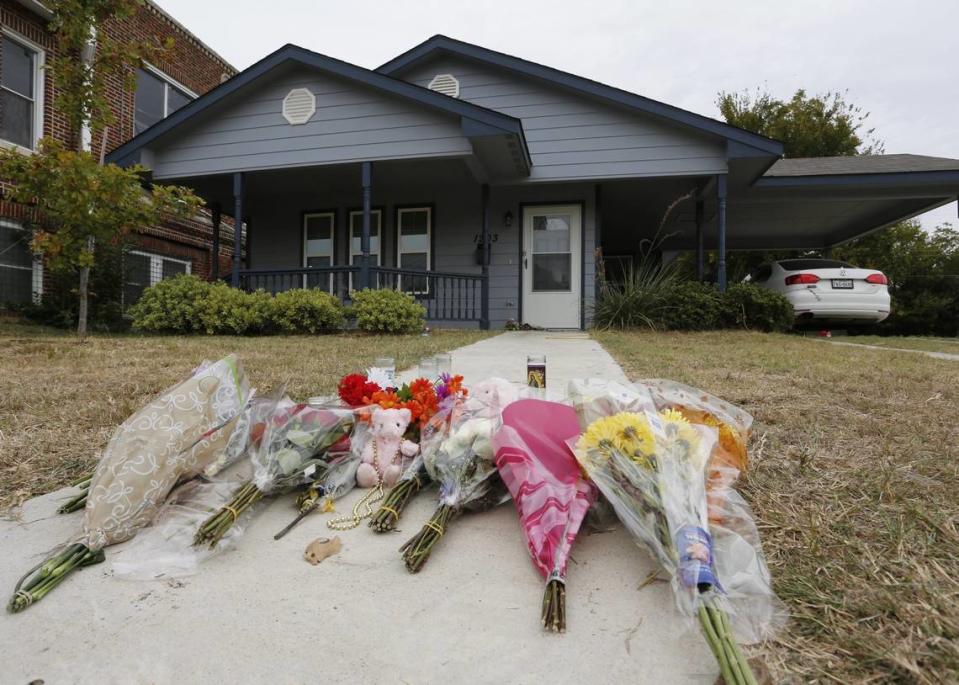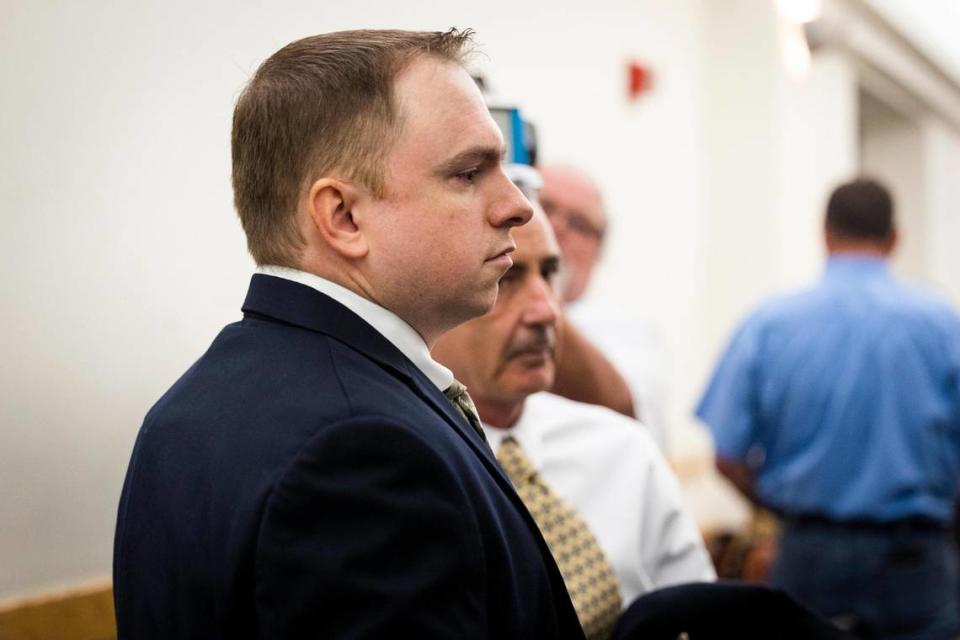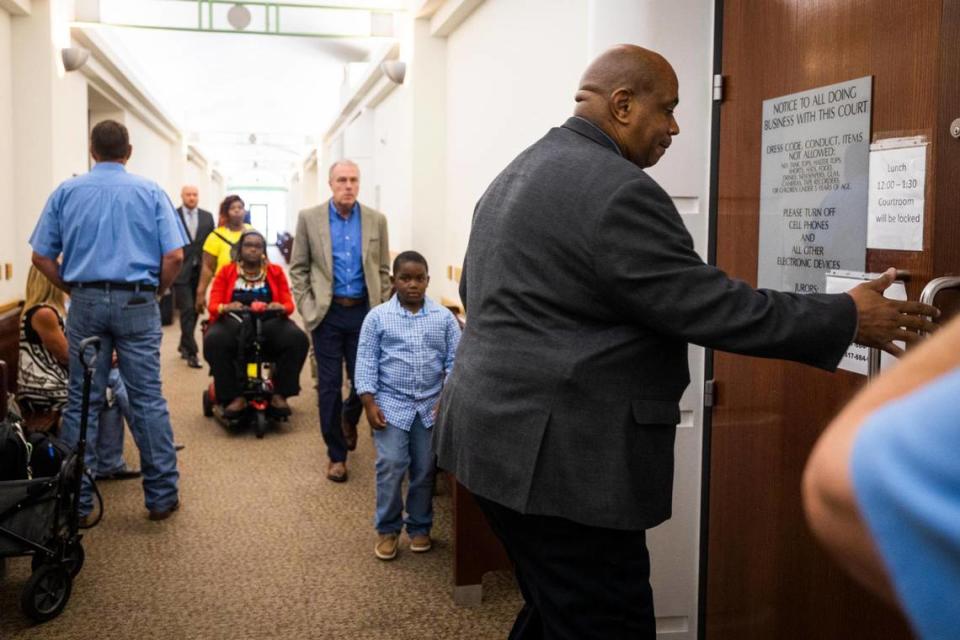As murder trial opens, jurors to weigh Fort Worth police officer’s fear of woman’s gun
From opposite sides of the house’s outer wall, Aaron Dean and Atatiana Jefferson stood facing one another, their bodies fixed in the middle of the night within a window.
The only eyewitness who was inside the ranch-style home on East Allen Avenue in Fort Worth told an interviewer working on behalf of law enforcement authorities that Dean and Jefferson each held a gun.
Before that encounter illuminated by flashlight, neither Dean nor Jefferson was certain that the other was there. Jefferson and a child were in a back bedroom at ground level. Dean, a police officer, walked with another officer outside, along dark blue siding, through a fence gate into the back yard and to the window.
Even when they were in view of each other, separated by glass, neither was certain why the other was there.
Jefferson, who was 28 and had moved in with her mother to help as her health declined, was with her nephew. She may not have known that the man and woman outside the house in the Hillside-Morningside neighborhood were police officers.
A 2:25 a.m. report from a neighbor to police of open front and side doors launched the officers’ response on Oct. 12, 2019. The Saturday sky was clear, and the temperature was in the 40s.
The neighbor had assessed that the open doors were unusual and wondered whether everything was as it should be. The neighbor’s intent that the police confirm the welfare of the residents was lost. A police communications employee classified the matter as an open structure.
Two sedans, which the neighbor recognized as belonging to the residents, were parked in the driveway. Light filled the interior of the house.
For the two police officers who arrived separately, there was scant information. What was going on inside the house? Were the open doors an oversight or intended? The outer screen doors were closed. Perhaps someone was inside the house who should not be.
Jefferson may have wondered who was walking outside of the house and what danger there may be.
What is known now about the innocuous circumstances before the shooting is more complete than the information that the involved people — Dean, Jefferson, Officer Carol Darch and Zion Carr — had at the time.
Zion, Jefferson‘s 8-year-old nephew, told Lindsey Dula, a civilian forensic interviewer trained to question children who may have knowledge of crimes, that he and Jefferson were playing video games in the back bedroom. Jefferson told Zion “that she heard noises coming from outside and she took her handgun from her purse,” the child said in an interview, according to the an affidavit supporting Dean’s arrest.
Zion said that, “Jefferson raised her handgun, pointed it toward the window, then Jefferson was shot and fell to the ground,” according to the affidavit.

Dean’s view before the shooting is known because it was recorded on a camera attached to his body, and the images were released to the public. The 34-year-old officer looked into the front doors, whispered to Darch, the other officer, and continued along the driveway to the back of the house. He turned on his flashlight, opened and walked through a gate in a fence and stood next to a window near an air-conditioning unit.
With his left hand, Dean shined the flashlight toward the window and raised a handgun with his right hand.
“Put your hands up! Show me your hands!” Dean yelled. Darch did not speak.
The word “hands” had barely slipped from his mouth when Dean pulled the trigger.
He fired one round. The bullet pierced the window and tore into Jefferson.
Both officers entered the house, according to the city’s assertion in a civil legal filing. Dean administered CPR. Darch took Zion outside.
Jefferson died in the bedroom.
The furor was swift. On the first weekday after the shooting, Dean resigned and, that evening, his former colleagues arrested him. City political and police officials publicly assessed that Jefferson’s death was unjustified. Dean was charged with murder six days after the shooting and indicted on that offense on Dec. 20, 2019.
Dean is white, and Jefferson was Black. Demonstrators in downtown Fort Worth suggested that race fueled Dean’s actions. Since then, the coronavirus pandemic, scheduling problems involving expert witnesses, a Dean defense lawyer’s health and a judge’s compelled recusal have stalled the case.
The time to consider the killing’s circumstances at trial has arrived. The case, in 396th District Court in Tarrant County, will begin to unfold on Monday. Tarrant County Jury Bailiff Paula Giaimo Morales will summon a pool of people to the Central Jury Room at the Tim Curry Criminal Justice Center. Lawyers will select 12 jurors and as many as four alternates to serve in the event that a primary juror cannot continue on the panel. The defense and state have estimated the trial’s length at 10 to 14 days.
The Tarrant County Sheriff’s Office, which handles security operations inside the courthouse, has prepared deputies for a trial similar to the June 2017 case of Howard Baker, the Fort Worth Bandidos motorcycle gang leader who ordered the killing of a member of another gang during an ambush at a bar in Fort Worth.

Picking a jury
The jury selection, known as voir dire, involves probing the prospective candidates for sources of bias, in a process that begins with a questionnaire and is at first directed by the judge and later taken up by lawyers for the state and the defense. In the Dean trial, the selection may take five days.
The potential jurors will be asked if they know any of the witnesses and will be individually questioned about their knowledge of press accounts and exposure to other publicity.
The pool’s members likely will be asked whether they have read or watched news coverage of the case. If they have, the candidate will be asked whether he or she would be able to consider only evidence presented at trial. In cases in which there has been broad news coverage, jurors often say they viewed information in passing and do not recall details.
Judge George Gallagher has suggested that he will wait until jury selection is underway to make a final ruling on a supplemental defense motion that seeks a change of venue, which, if he grants, would move the trial outside Tarrant County.
It is possible that the attorneys will ask prospective jurors whether they have seen the body-worn camera recording of the shooting that the police department released. (The images are not crisp at the window because of the reflection of Dean’s flashlight.)
The attorneys are expected to ask how potential jurors feel about policing. For instance, do they assume something that a police officer says is more credible than a civilian? The attorneys almost certainly will ask whether potential jurors have been the victims or suspects in crimes, and, if they have, whether they were treated fairly and how those experiences inform their point of view.
Attorneys sometimes ask people in a juror pool about their religious beliefs and whether they could imagine themselves sentencing a person to life in prison. If Dean is found guilty of murder, the jurors will determine a prison sentence of between five and 99 years, or life.
The prospective jurors will be asked about their occupation, language barriers and any personal scheduling problems so significant that they would distract the juror.
The state and the defense each may strike 10 people for any reason outside of race. After those exclusions, they may make unlimited challenges if they cite a permissible reason.
The case is being prosecuted by a Tarrant County Criminal District Attorney’s Office team led by Dale Smith. It includes Ashlea Deener and Victoria Ford Oblon.
Dean is represented by Jim Lane, Bob Gill and Miles Brissette. Lane’s in-courtroom participation during the trial is in question because of his health.

The trial will occur on the courthouse’s seventh floor. There is space for about 65 people in the gallery. A live video feed of proceedings will be played in two other courtrooms. The Dean and Jefferson families and supporters will likely sit in groups on opposite sides of the gallery.
Gallagher is the second judge to preside in the case after a former state appellate court justice ordered the case’s transfer from Judge David Hagerman’s domain in 297th District Court.
The defense filed a motion that sought a recusal order on the grounds that Hagerman’s impartiality might reasonably be questioned and that he held a personal bias or prejudice against Dean attorney Gill. Retired Second Court of Appeals Justice Lee Gabriel granted the motion in June.
David Evans, the presiding judge of the Eighth Administrative Judicial Region of Texas, transferred the case to Gallagher, who has presided in 396th District Court for 22 years. Gallagher sometimes holds a pen in his mouth when he is on the bench. His usual procedure is to restrict jurors from taking notes.
The path to indictment
The defense suggested at a pretrial hearing that prosecutors concluded they needed to arrest Dean in order to make a recommendation on indictment to grand jurors without departing from longstanding protocol.
The Tarrant County Criminal District Attorney’s Office procedure in cases in which civilians were shot by law enforcement officers who were not arrested called for the office to refrain from making an indictment recommendation to grand jurors, testified Robert Huseman, who at the time of the Jefferson killing was the chief of the office’s law enforcement shooting investigation team.
Wilson determined that for the district attorney’s office to make a recommendation in the Dean case, a law enforcement officer would need to prepare an arrest warrant affidavit and take the officer into custody, Huseman testified.
Under direct examination by Gill, Huseman recalled a meeting in Wilson’s office in the hours before Dean’s arrest in which Wilson took a 15-minute call on her cellphone from Ed Kraus, who was then the interim chief of the Fort Worth Police Department, during which Wilson asked Huseman and others to leave her office.
Later in the day, Judge Chris Wolfe, who presides in 213th District Court, was asked to go to his chambers. He arrived with his child and at 6:01 p.m. signed the warrant. Dean was arrested.

Huseman’s account of Wilson’s thinking on an indictment in the Dean case is the second time a witness has testified at a pretrial hearing about the involvement of Wilson, the county’s chief law enforcement officer. Wilson is departing the office in five weeks after she declined to seek reelection.
Craig Driskell, the executive chief deputy of operations at the Tarrant County Sheriff’s Office, was subpoenaed to testify for the defense at a hearing on the motion to recuse Hagerman.
After the defense witness list for the hearing was filed, Driskell testified, Wilson called him and asked why he was on the list.
Driskell testified that he told Wilson that he expected to be asked about his courtroom observations of Hagerman.
“Well, you don’t work for me,” Wilson observed in the telephone conversation. She offered advice: “Quit talking,” Driskell testified, recalling the district attorney’s statement.
The legal questions
A gag order restricts prosecutors and Dean’s attorneys from furnishing information on the case outside of court and both last week declined a reporter’s request to discuss the case and publicly chart their trial plan.
Criminal law experts and attorneys uninvolved in the case described the path that they expect it to take and provided a primer on strategic decisions they considered likely.
The central question at trial will be whether Dean was protecting himself when he shot Jefferson.
It is now known that Jefferson, before she held her gun, was not a threat to Dean. The legal experts said the trial will focus on whether Dean firing upon her was reasonable because he believed that her pointed gun was a threat.
Many of the experts said that it is likely that jurors will hear directly from Dean, who had been employed by the department for 18 months when he shot Jefferson in the torso.
“In self-defense cases it’s much more common for the defendant to testify,” said Cody Cofer, a criminal defense attorney in Tarrant County state courts and in U.S. District Court.
If he does, likely at the end of the defense case in order for his testimony to hold more power, Dean will describe what he saw and his thinking.
“The right of self-defense is one that turns on reasonableness,” said Sandy Thompson, a professor at University of Houston Law Center.

To find Dean not guilty of murder, jurors would have to conclude that he made a reasonable assessment of whether he faced an imminent threat of serious bodily injury or death. The legal justification also applies when the perception proves to be incorrect.
The self-defense statute justifies a killing “even if the person was wrong,” Thompson said. The jury may find, for instance, that “both people involved did the right thing.”
The jury’s determination on reasonable-threat assessment will be the fundamental element that will decide the case, said Stephen Gordon, a former prosecutor in Tarrant County who works now as a criminal defense attorney.
“That’s really what the fight is going to be,” Gordon said. “This is not an easy prosecution for murder.”
The jury likely be will directed to examine the circumstances through the eyes of the defendant.
Gordon said that it will be critical to answer the question of whether, when Dean looked into the window, he saw a gun or anything else that amounted to an imminent threat of death to him.
“He’s going to have to say there was a reason for that shooting to occur,” Gordon said.
The location of the death, in terms of the law, does not matter. The factors and evidence that would justify a killing in self-defense apply without regard to location.
Still, Cofer said, it likely will be difficult for jurors to disregard that an innocent woman was shot by a police officer in a house where she was living.
Statutes related to the legality of firearm possession are not in question in the Dean case.
Darch, the other officer present, may testify about what Dean said to her immediately after he fired, and a segment of the body-worn camera video that the police department did not previously release may be played for jurors.
“Officer Darch said that they went into the backyard and Officer Dean was standing between her and the house and she could only see Jefferson‘s face through the window when Officer Dean discharged his weapon one time,” Anthony Rimshas, a Fort Worth police Major Case Unit detective who is the lead investigator in the case, wrote in the arrest warrant affidavit.
“Officer Dean declined to provide an interview on the date of the shooting. Officer Dean’s legal counsel said he would provide a written statement at a later date,” but did not, according to the affidavit.

Also critical to the trial will be the account of Zion Carr, who was 8 when his aunt died. He was in the room and appears to have seen the shooting. He is on the state’s witness list.
“It is likely that he’s going to have to testify,” Gordon said. The defense may explore whether the child was influenced or felt pressure during his interview.
Beyond the arrest warrant affidavit’s reference to Zion’s account that Jefferson pointed a handgun, Gill at the pretrial hearing on the change of venue motion cited other elements of the interview. Zion told the forensic interviewer that he “saw the officer’s badge” and that his aunt “did not do what the police officer told her to do.” The interview concluded at 5:30 a.m., about three hours after the shooting.
Lists of witnesses are filed with the court. Some of the people on the lists will not be called to testify. There are 149 Fort Worth Police Department employees on the state’s list.
The state’s list includes Jonathyn Priest, who worked as a Denver Police Department officer for 32 years. Now retired, Priest is a consultant on police use of force and an instructor on law enforcement matters.
The Tarrant County Criminal District Attorney’s Office most recently called Priest to testify as an expert in its criminally negligent homicide prosecution in August of Ravinder Singh who, as an Arlington police officer, shot to death a woman when he intended to fire upon her dog as it ran toward him. Priest’s testimony included a blunder. He told jurors that he had spit-balled a measurement, a description that Singh’s defense later argued raised doubts about his precision.
Priest testified that he had concluded that the Singh shooting was neither reasonable nor necessary under its circumstances. A jury found Singh not guilty.
Two other expert witnesses, Aaron Pierce and Grant Fredericks, are expected to be called by the defense.
Pierce is an expert in forensic mental health matters and offers testimony on, among other topics, forensic interviewing protocols and eyewitness credibility. Fredericks is a certified forensic video analyst.
Prosecutors may also have information that investigators found on Dean’s cellphone. They executed a search warrant in which the affidavit supporting it was written by district attorney’s office investigator Marvin “Mo” Brown, according to Gill’s questioning at a hearing on the recusal motion.
A verdict
It is possible that Gallagher will permit the jury to consider offenses beyond murder. The judge will make that decision at the close of evidence presentations at a jury charge conference, for which the state and defense will submit instruction proposals. The most common lesser-included offenses in a case being tried as a murder allow for a conclusion that the defendant did not have the intent required for murder.
Gallagher may allow the jury to consider manslaughter, which is a killing committed recklessly, or criminally negligent homicide.
The law requires that for the jury to evaluate alternative crimes there must be evidence that the defendant committed the lesser-included offense “to the exclusion” of the indicted crime.
The defense filed a motion seeking an order to sequester the jury during its deliberation.
If it finds Dean guilty of an offense, the jury will move to a punishment phase hearing. If the verdict is not guilty, Dean will remain in civil legal peril. The administrator for Jefferson’s estate filed a lawsuit in U.S. District Court in which Dean is among the defendants.
The case would end with a mistrial if the jury cannot reach a unanimous verdict.

 Yahoo Sports
Yahoo Sports 